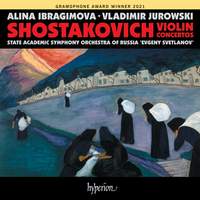Recording of the Week,
Shostakovich from Alina Ibragimova
Alina Ibragimova and Shostakovich seem such natural bedfellows that it came as quite a surprise to me that this Hyperion release of the two Violin Concertos is in fact her first recording of the composer’s music: the First Concerto has been in her repertoire since her teens, and I remember being blown away by the intensity of a live performance she gave with Gianandrea Noseda in Manchester around ten years ago. But the Russian-born violinist has bided her time before committing these works to disc: in our recent interview about the recording, she cited the need to build up the physical and emotional stamina which the music demands through live performance, and it’s certainly been worth the wait.
 It’s a fair while since Ibragimova has made a concerto recording, and coming to this album after enjoying her intimate, conversational accounts of Mozart and French sonatas with Cédric Tiberghien I was slightly taken aback by the sheer size of the sound she summons here when required - not just when pitted against the muscle of Jurowski’s Russian orchestra, but also in the mighty cadenza of the First Concerto (written in the late 1940s, but kept on ice until after the death of Stalin), where she seems to constitute an entire string section in her own right.
It’s a fair while since Ibragimova has made a concerto recording, and coming to this album after enjoying her intimate, conversational accounts of Mozart and French sonatas with Cédric Tiberghien I was slightly taken aback by the sheer size of the sound she summons here when required - not just when pitted against the muscle of Jurowski’s Russian orchestra, but also in the mighty cadenza of the First Concerto (written in the late 1940s, but kept on ice until after the death of Stalin), where she seems to constitute an entire string section in her own right.
This is Ibragimova and Vladimir Jurowski’s second collaboration on disc, following their 2012 accounts of the Mendelssohn concertos, and as on that recording Jurowski’s choice of orchestra suits the repertoire to perfection: if the Mendelssohn benefited from the airy buoyancy of the Orchestra of the Age of Enlightenment, the grit and gravitas of the State Academic Symphony Orchestra of Russia 'Evgeny Svetlanov' are no less ideal here. A few days after first hearing this recording, I spent a fascinating half-hour talking to Vasily Petrenko about his upcoming recording of Rimsky-Korsakov with the Oslo Philharmonic, and one of the things we discussed was what exactly constitutes the ‘Russian orchestral sound’ which reviewers often praise him for summoning from non-Russian orchestras. Fragments of the conversation played through my mind when I revisited this Shostakovich, in particular his remarks about certain qualities in the strings: Russian teachers and conservatoires, he observed, have until very recently trained every string-player as a future ‘Oistrakh or Rostropovich’ rather than an embryonic orchestral musician, and one of the hallmarks of this approach is the weight which they apply in the middle of the bow as well as in the naturally heavier lower section near the frog.
 This certainly holds true in the sonorous opening of the First Concerto, where cellos and basses conjure a concentrated, highly-pigmented sound that sets the tone for the rest of the album and later filters up through the violas and violins; it’s ideal for Shostakovich’s searing, claustrophobic emotional landscape here, in which the tension rarely lets up, though the recording engineers allow plenty of breathing-space around the sound so that nothing becomes unduly harsh or pressurised. (Ibragimova herself is recorded up-close-and-personal, the mics catching the rasp of wood-on-string and the occasional percussive impact of fingers-on-fingerboard in the most strenuous passages, all of which captures the physicality of the performance to great effect – you can practically smell the rosin and sweat in places).
This certainly holds true in the sonorous opening of the First Concerto, where cellos and basses conjure a concentrated, highly-pigmented sound that sets the tone for the rest of the album and later filters up through the violas and violins; it’s ideal for Shostakovich’s searing, claustrophobic emotional landscape here, in which the tension rarely lets up, though the recording engineers allow plenty of breathing-space around the sound so that nothing becomes unduly harsh or pressurised. (Ibragimova herself is recorded up-close-and-personal, the mics catching the rasp of wood-on-string and the occasional percussive impact of fingers-on-fingerboard in the most strenuous passages, all of which captures the physicality of the performance to great effect – you can practically smell the rosin and sweat in places).
Petrenko’s image of an orchestra comprised of soloists (which Jurowski, too, clearly relishes) also resonates loud and clear in the string-players’ responsiveness to Ibragimova’s every shift in tone-colour – time and again I was reminded of Strauss’s Metamorphosen for 23 solo strings (composed shortly before the First Concerto) as they follow her lead in draining colour from their sound in the elegiac slow movements and digging right into the string in the adrenaline-fuelled finales. Wind principals, too, rise to the occasion with assertiveness when called into the spotlight: there’s real poetry from the first bassoon in the First Concerto, whilst the principal horn is wonderfully raw and pugnacious when trading phrases with Ibragimova in the Second Concerto’s cadenza.
Ibragimova’s next recording project is the Paganini Caprices (an alluring prospect in the light of her handling of the great cadenzas here), but I’m crossing fingers that more twentieth-century concertos might figure in her future – the Bartóks and Prokofievs would suit her down to the ground…
Alina Ibragimova (violin), State Academic Symphony Orchestra of Russia 'Evgeny Svetlanov', Vladimir Jurowski
Available Formats: CD, MP3, FLAC, Hi-Res FLAC, Hi-Res+ FLAC



